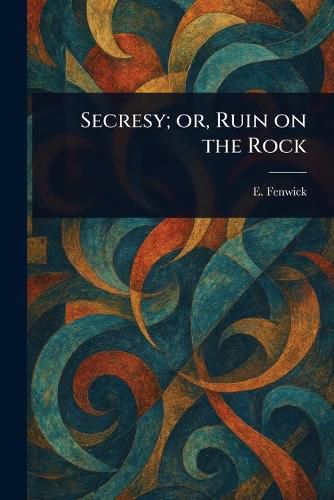Readings Newsletter
Become a Readings Member to make your shopping experience even easier.
Sign in or sign up for free!
You’re not far away from qualifying for FREE standard shipping within Australia
You’ve qualified for FREE standard shipping within Australia
The cart is loading…






This title is printed to order. This book may have been self-published. If so, we cannot guarantee the quality of the content. In the main most books will have gone through the editing process however some may not. We therefore suggest that you be aware of this before ordering this book. If in doubt check either the author or publisher’s details as we are unable to accept any returns unless they are faulty. Please contact us if you have any questions.
"Secresy, or, Ruin on the Rock," by Eliza Fenwick, is a compelling 18th-century epistolary novel exploring themes of secrecy, social class, and ultimately, ruin. Through a series of revealing letters, Fenwick masterfully portrays the lives and experiences of her female characters, offering a poignant glimpse into their challenges and triumphs within a rigid societal structure.
This meticulously prepared edition allows readers to immerse themselves in a world of hidden truths and precarious social standing. The novel delves into the complexities of women's lives and relationships, painting a vivid picture of a bygone era. "Secresy" remains a powerful and relevant exploration of enduring human themes, solidifying its place as a significant work of historical romantic fiction and literary fiction with a focus on women's stories.
This work has been selected by scholars as being culturally important, and is part of the knowledge base of civilization as we know it.
This work is in the public domain in the United States of America, and possibly other nations. Within the United States, you may freely copy and distribute this work, as no entity (individual or corporate) has a copyright on the body of the work.
Scholars believe, and we concur, that this work is important enough to be preserved, reproduced, and made generally available to the public. We appreciate your support of the preservation process, and thank you for being an important part of keeping this knowledge alive and relevant.
$9.00 standard shipping within Australia
FREE standard shipping within Australia for orders over $100.00
Express & International shipping calculated at checkout
This title is printed to order. This book may have been self-published. If so, we cannot guarantee the quality of the content. In the main most books will have gone through the editing process however some may not. We therefore suggest that you be aware of this before ordering this book. If in doubt check either the author or publisher’s details as we are unable to accept any returns unless they are faulty. Please contact us if you have any questions.
"Secresy, or, Ruin on the Rock," by Eliza Fenwick, is a compelling 18th-century epistolary novel exploring themes of secrecy, social class, and ultimately, ruin. Through a series of revealing letters, Fenwick masterfully portrays the lives and experiences of her female characters, offering a poignant glimpse into their challenges and triumphs within a rigid societal structure.
This meticulously prepared edition allows readers to immerse themselves in a world of hidden truths and precarious social standing. The novel delves into the complexities of women's lives and relationships, painting a vivid picture of a bygone era. "Secresy" remains a powerful and relevant exploration of enduring human themes, solidifying its place as a significant work of historical romantic fiction and literary fiction with a focus on women's stories.
This work has been selected by scholars as being culturally important, and is part of the knowledge base of civilization as we know it.
This work is in the public domain in the United States of America, and possibly other nations. Within the United States, you may freely copy and distribute this work, as no entity (individual or corporate) has a copyright on the body of the work.
Scholars believe, and we concur, that this work is important enough to be preserved, reproduced, and made generally available to the public. We appreciate your support of the preservation process, and thank you for being an important part of keeping this knowledge alive and relevant.